It is the largest city in Latin America, a cosmopolitan melting pot with a thriving economy, home to an array of sporting legends, and the biggest mecca for Portuguese speakers on the planet. Life as an international mover in São Paulo, Brazil, is no walk in the park, but there are plenty of reasons for residents and expats to look ahead with optimism. By Andrew Bennett
It may not have the tourist appeal of its more famous sister city Rio de Janeiro, but with its status as a major business hub – not just for Brazil, but for the whole of Latin America – and a population of more than 10 million people, São Paulo takes some beating. Put simply, if you’re serious about doing business in Latin America, you need to be here.
The international moving industry is no exception, and its work over the years has helped underpin São Paulo’s economic success. Eight FIDI-affiliated moving companies have carved out a presence in this mega city, an impressive feat given the tough levels of competition and the unique challenges that operating in Latin America brings.
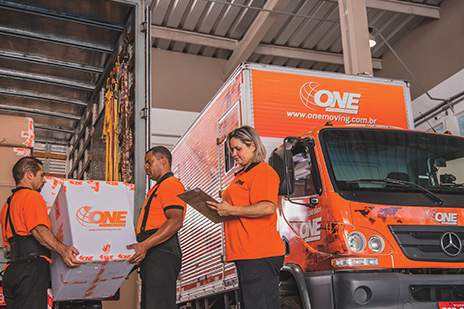
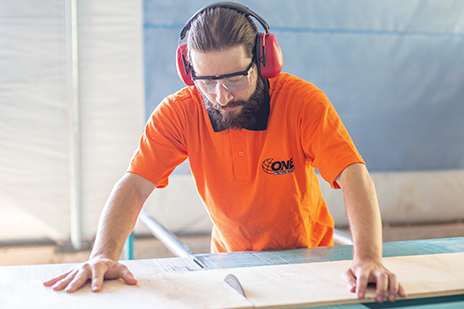
‘São Paulo is the economic capital of Brazil and Latin America. Most large global and regional companies are based in São Paulo and, consequently, we have a large contingent of expatriates, which always guarantees a high demand for international moves,’ says Wesley Thomé, Executive Director at FIDI Affiliate One Moving & Logistics.
‘In addition, we are less than an hour from Santos, the largest port in Latin America. This port is more modern and agile – and cheaper for dispatching moves – than other ports in Brazil.’
At Transworld Moving Ltd, Account Manager Jason Lacayo says: ‘São Paulo is the largest and richest state of Brazil, so there is more traffic than there is in Rio.’ Lacayo says Rio de Janeiro – where his family’s business was founded in the 1980s – is a very important market, but he points out: ‘Brazil’s economy is so diverse there are endless opportunities.’
At Teamwork Mudancas Internacionais Ltda, CEO Lars Peter Lemche has another reason for rating São Paulo as a top business location.
‘Today, security is a bit better in São Paulo than other cities. Rio has become very dangerous, and is not recommended to the expat community,’ he said.
Strong Japanese presence
Brazil is noted for its cultural diversity, with people from many different backgrounds, countries and ethnicities making a home for themselves across this large nation. São Paulo stands out for having the biggest population of Japanese people living outside of their home nation. According to one estimate, more than 1.5 million Japanese live in São Paulo. As a result, the city has more than 600 Japanese restaurants selling in excess of 12 million sushi every month. Some believe this greatly outnumbers the churrascarias – Brazilian barbecue steakhouses.
While the contribution of Japanese people to this lively city is evident, this community doesn’t necessarily benefit the moving industry hugely.
Cristiane Balista, Managing Director at FINK Mobility’s São Paulo office, explains that the city’s Liberdade neighbourhood has become noted as a local attraction. ‘This is a tourist district known for the largest Japanese community in the municipality, which is considered the largest in the world outside of Japan,’ she says.
The origins of the Japanese community in this Brazilian mega-city date back to 1908, according to Balista. ‘The ship Kasato Maru arrived in the state of São Paulo, bringing 781 Japanese people to Brazil,’ she says. ‘They were farmers who came to work on the many coffee farms in the interior of the state.’
The presence of this large immigrant group means moves between Japan and Brazil, and vice versa, says Balista: ‘For companies that focus on private moves, this is certainly a community to take into account.’
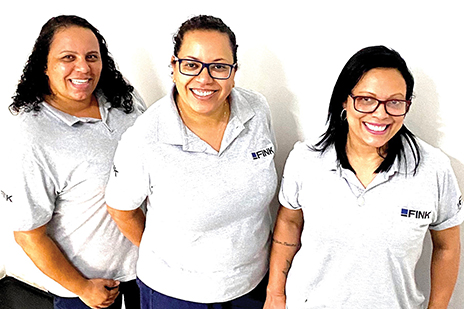
Lemche, at Teamwork, doesn’t see a huge opportunity, however. ‘The Japanese auto industry and some other manufacturing/machinery plants are strong in Brazil, but most of them are very loyal to their own suppliers. Japanese (business) only works with (the) Japanese,’ he says. ‘Japanese people are known for only moving with what fits in their suitcase.’
One Moving & Logistics also handles more traffic from other markets. Thomé says: ‘Although the Japanese community is very large in Brazil, the immigration process took place in the past. Nowadays, we have several Japanese companies operating in Brazil, but, because of the distance between countries, the number of international changes is not so great compared with some other countries.’
However, Aline Gerson Capani, Director at Gerson & Grey, says the Japanese presence in São Paulo has had an influence on the city’s gastronomy, arts and traditions. ‘Japanese and Italians are the largest ethnic groups inhabiting São Paulo metropolitan region,’ Capani adds.
Japanese companies are present in automotive, electronics, construction, financial, transportation, chemicals and consulting sectors, among others, she says, with Honda, Yamaha Motors, Toyota, Sony, Nissan, Mitsubishi and Epson represented.
‘Assignments between Japan and the state of São Paulo promoted by these companies turn out to offer great potential,’ says Capani.
Mecca for multinationals
Given its status as a major regional hub with influence stretching far beyond Brazil, the multinational sector is big in São Paulo, and major businesses across many industry sectors are represented here.
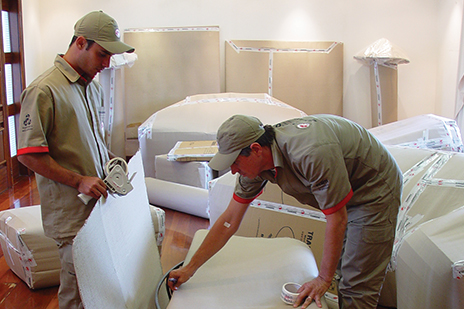
Lacayo, at Transworld, says that, for his company, ‘corporate moves are essential; it gives that steady volume during the year, which is very important for any company. The private market is also vital, but more seasonal, and the same applies to diplomatic moves’.
Meanwhile, One Moving works with almost all the business sectors based in and around São Paulo – but ‘without a doubt the automotive sector is our main highlight,’ says Executive Director Thomé. ‘The pharmaceutical and mining industries also stand out a lot.’
FINK Mobility does business with a vast range of business sectors, making it ‘impossible to select the most important one, as volumes change,’ according to Managing Director Balista, but ‘we certainly have the top 25 corporate customers, all in different sectors’.
For Lemche and his colleagues at Teamwork, the biggest customers are the pharmaceutical industry, agribusiness and banking.
Changing times
In recent years, moving company bosses have noted several trends that have affected their volumes and the type of customer base with which they deal.
For FINK Mobility, there has probably been more stability operating within Brazil’s largest economy than for others. Balista says its customer base and business sectors have not changed in recent years.
‘Volumes increase and decrease depending on the economic and political situation of the country,’ she says. ‘Normally, when exports decrease, imports increase, or vice versa, so there is always business.’
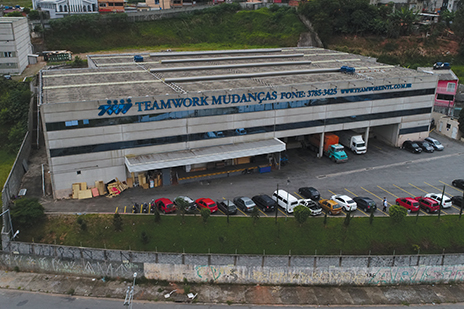
Others, however, have felt the winds of change. At Teamwork International, Lemche says his staff are seeing more IT executives, along with app developers, coming to and going from Brazil.
Despite this, traditional sectors are ‘still pretty much active’, says Lemche, although the moving market is undergoing considerable churn.
‘We saw that at a presentation during the PAIMA (Pan American International Movers Association) Convention in Chicago. A guest speaker told us that the young people are not attached to anything, they will maybe ship a skateboard, two suitcases with clothes and a boombox,’ said Lemche, who is PAIMA President.
‘They carry their laptop and iPhone. This is a global sight of our near future. But these young people will get married or live together one day, and maybe have a baby. Then they will start buying (physical possessions) again, hopefully.’
For One Moving, Thomé says: ‘We note that the private moving market has grown a lot in Brazil and, compared with 10 years ago, we notice that the volume of the shipments is considerably smaller.’
No country for the faint-hearted
Few markets in the world offer easy pickings for international movers, but Latin America is certainly not a place for the timid. Without a high degree of resilience and flexibility, you had best forget it.
São Paulo brings its share of challenges to operational staff, says Lacayo: ‘Like any big city, it has lots of problems with heavy traffic and restrictions for trucks during certain hours of the day and in certain locations. That can be tricky when we are delivering a shipment in a restricted area.’
Thomé cites ‘bureaucratic difficulties’ in common with other Latin American regions, plus ‘high costs with fees and ports’. ‘But we have noticed an improvement in this environment recently. For example, today we can offer our partners and customers the flat rate for port charges (in Santos). This was not possible a few years ago.’
He added: ‘Competition between moving companies is quite fierce in São Paulo. But this makes the business environment healthier and more challenging, thereby increasing the quality of services for clients.’
At Gerson & Grey, Capani cites local tax burdens and fiscal complexity as ‘major challenges.’ However, she says: ‘Changes are under way in Congress aimed at making the country more competitive. They should be approved this year.’
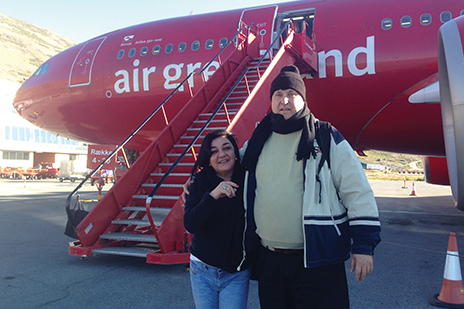
Teamwork’s CEO Lemche adds: ‘The Latin world is very different from the rest of the world. Bureaucracy and high taxes are the worst enemies of foreign companies coming to South America in general. Corruption and insecurity are also challenges.’
There are, however, reasons to feel positive about the future. Thomé sees increasing decentralisation of the moving and hiring process affecting global mobility and believes ‘corporations will give their employees more freedom to choose who to move with’.
‘With the resumption of (growth in) the Brazilian economy with our new president, and an end to the corruption scandals, we are confident that our international moving market can grow by around 12 per cent in 2020 and 2021, and end a series of recessions in recent years,’ he says.
For FINK, Balista cites the general health of the Brazilian economy. ‘We have all types of foreign industries investing in Brazil,’ she says, ‘all of them with executives that move to and from the country. Infrastructure, oil and gas are some of the sectors we believe will grow in the next few years.’
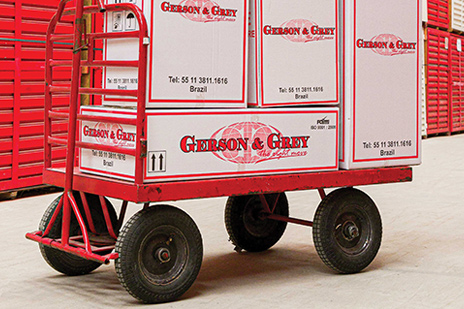
Red hot culture scene
Aside from the thriving business scene, there are many other reasons to move to Brazil, and the vibrant culture comes high up the list.
Gerson Capani explains: ‘Living in São Paulo means having at your disposal one of the most diverse gastronomic centres in the world, as well as numerous shopping malls of a very high standard, luxurious nightclubs and show houses, and theatres such as Credicard Hall, Sala São Paulo and the Theatro Municipal, as well as the Mosteiro de São Bento, among other attractions.’
Sports fans are also very well served. As well as having stadia constructed for the 2014 FIFA World Cup, São Paulo (and Brazil) boasts some of the best footballers in the world – and fervent fans.
Thomé says: ‘Football is our national passion. All children learn to play from a very young age, so we have a good chance of discovering great players. São Paulo has Corinthians – the football club with the highest number of world titles recognised by FIFA – which makes all paulistanos (city residents) very proud.’
Take a few tips from the Paulistanos:
When visiting, try the following:
Cristiane Balista, at FINK Mobility, says don’t miss out on:
- Parque Ibirapuera – the most visited park in Latin America.
- MASP – The Museum of Art of São Paulo – has beautiful architecture and a very special collection of artwork.
- One of the many Michelin-starred restaurants in the city.
Wesley Thomé, at One Moving &
Logistics, advises:
- ‘Watch a football match in the city’s most modern arenas, which were built for the 2014 FIFA World Cup.
- ‘To drink: try caipirinha. You can find it everywhere – but don’t overdo it if you have a meeting the next day!’
Lars Peter Lemche, of Teamwork, recommends being security conscious:
‘Don’t wear jewellery, watches or gold chains, and have your devices in view, no matter where you are in Brazil. Keep your cash and ID in your pockets; don’t take wallets or purses.
However, he adds: ‘There are restaurants of all kinds in São Paulo, but the foreigners must try churrascarias and feijoada houses. Churrascarias are meat restaurants serving food on skewers, and feijoada is a typical black bean and pork stew, brought from Africa by the slaves.
‘São Paulo has many museums and parks. Ibirapuera park and MASP museum are the most important ones. In downtown São Paulo, the Pátio do Colégio and the São Bento Monastery are where the Portuguese colonists started the city of São Paulo, called São Paulo de Piratininga.
‘But Brazil is big, so I would recommend not spending too much time in São Paulo. Go to the Pantanal and Amazon areas, where there is wildlife, and see the waterfalls of Iguaçu.’
Jason Lacayo, of Transworld Moving, recommends:
‘The eye-catching centrepiece of Avenida Paulista, the city’s most famous street, is the São Paulo Museum of Art (MASP), which hosts an impressive permanent collection of works by Brazilian and international artists, as well as attracting some of the country’s best temporary exhibitions. I also recommend the football history museum (based in Pacaembu Stadium); football is my favourite spot.’
Gerson & Grey’s Aline Capani says:
‘Three traditional spots would be:
- Mercado Municipal to try our diversity of foods
- Theatro Municipal, for its architecture and the quality of the shows
- Mocotó is a very nice restaurant. The chef, Rodrigo Oliveira, who is world renowned, offers a typical Brazilian cuisine served in a simple but sophisticated way.’
FIDI AFFILIATES BASED IN SÃO PAULO
| FINK MOBILITY | AFFILIATED BRANCH | SÃO PAULO |
| G-INTER | AFFILIATE | SÃO PAULO |
| GERSON & GREY | AFFILIATE | SÃO PAULO |
| NETMOVE | AFFILIATE | SÃO PAULO |
| ONE MOVING & LOGISTICS | AFFILIATE | SÃO PAULO |
| SIRVA RELOCATION | AFFILIATE | SÃO PAULO |
| TEAMWORK MUDANCAS INTERNACIONAIS | AFFILIATE | SÃO PAULO |
| TRANSWORLD MOVING | AFFILIATE | SÃO PAULO |

